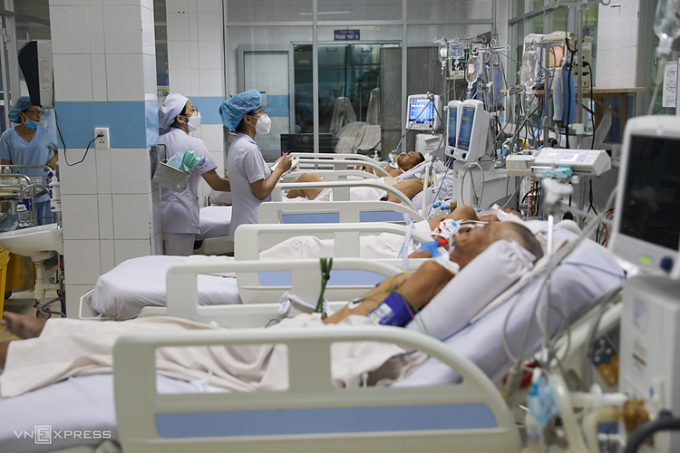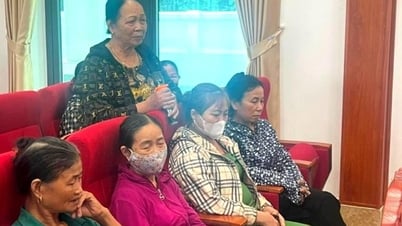The doctor encouraged and explained the patient's condition to the patient's family (illustrative photo)
Despite being advised, the man in Hanoi did not change his mind and eventually signed a voluntary discharge form. However, before he could leave, he suffered a severe headache due to increased intracranial pressure. He fell into a coma, but was fortunately rescued by doctors in time and survived the critical condition.
This is one of many cases that Dr. Doan Du Manh, Deputy Director of the Cardiovascular and Stroke Center, Phuong Dong General Hospital, an expert in the field of vascular and thoracic surgery and intervention, has received. According to Mr. Manh, many patients with traumatic brain injury do not know that the initial stage of consciousness, called "consciousness interval", is only a temporary sign. When complications arise, the condition can cause the patient to fall into a coma, or even die if not intervened promptly. The shorter the "consciousness interval", the greater the risk, but many people are still subjective because they think they have recovered.
Subjectivity of patients appears in all ages and circumstances. A 42-year-old female patient with pneumonia, high fever, and difficulty breathing was warned by Dr. Phan Van Phuc, Department of Emergency Resuscitation, Central Hospital for Tropical Diseases, that she needed to take a full course of antibiotics, but after only two days of fever reduction, she hastily signed the discharge papers. As a result, the disease relapsed severely, and the woman was hospitalized again in a state of respiratory failure and septic shock.
According to research published in BMC Medicine, patients who voluntarily leave the hospital before completing treatment have a 30-40% higher rate of readmission and death than those who fully comply with the regimen.
Not only physical illnesses, mental pressure also causes many people to leave the hospital early. Doctor Tran Thi Hong Thu, Deputy Director of Mai Huong Daytime Psychiatric Hospital, once received a case of a young girl with moderate depression who stopped treatment because "the hospital felt suffocating". After only one month, the patient returned in serious condition, with suicidal thoughts.
It is not uncommon for patients to insist on leaving the hospital midway through treatment. Some common reasons include: financial barriers, fear of hospitals, lack of understanding of the disease, psychological and mental problems (often seen in patients with mental illness), or unfulfilled family responsibilities.
Many people cannot afford to pay hospital fees even with health insurance, fearing that they will be a burden on their families, especially if they are the breadwinner or primary caregiver. Cancer is prominent among these because of its long treatment time, high cost, and low chance of survival if detected late.
The leader of K Hospital said that a person receiving targeted therapy or immunotherapy can spend 120-150 million VND per month, about 500-600 million VND to several billion VND per year, depending on the indication and type of drug. Each patient may have to undergo treatment for one to two years. The average cost of treatment for a cancer patient at this hospital is over 176 million VND per year. Insurance covers about 52 million VND and the patient must pay about 124 million VND himself, accounting for 70% of the total cost of treatment. Currently, only about 10% of cancer patients have access to this therapy.
Some people think they are "not that serious", or on the contrary, feel that they are too serious and cannot be cured, so they ask to go home. This also comes from a lack of understanding of the disease, not realizing that incomplete treatment can cause complications or relapse, subjectively giving up halfway, going back to traditional medicine, herbal medicine or advice from non-specialists.
For example, Phu Tho General Hospital once treated a 72-year-old woman who had an acute myocardial infarction, her heart stopped beating 7 times. Although her family asked to take her home, the doctor advised her to "try as hard as possible". Finally, after 6 times of treatment in a deep coma, on the 7th time her heart started beating again, and she was transferred to the Intensive Care Unit for treatment, and her health gradually stabilized.
Along with economic difficulties comes fear and fatigue. Many people feel that the cramped, stressful hospital environment and suffocating living conditions become a mental "poison". When each hospital bed is a battle for life, the feeling of mental and physical exhaustion makes many patients just want to go home soon, despite the warnings of doctors.
Dr. Phuc said that patients who demand to go home before completing treatment can pay the price with their health, even their lives. For example, pneumonia can develop into respiratory failure, ruptured appendicitis can cause sepsis, internal diseases such as high blood pressure, heart failure, stopping treatment or not closely monitoring can lead to stroke, heart attack, or death.
Patients must be readmitted to the hospital in a more difficult condition than the first time. Especially in severe cases or cases with psychiatric factors such as severe depression, hallucinations, suicidal thoughts, discharge from the hospital when not stable can lead to a high risk of death.
Abandoning treatment halfway can also cause drug resistance, or make the next regimen stronger and more toxic. Not to mention, losing trust between the patient and the doctor will cause the patient to not cooperate with subsequent treatments.
Regarding psychological issues, when a patient insists on going home, medical staff may feel helpless or heartbroken, while the family lives in anxiety or torment if the patient's condition worsens, according to Ms. Thu.
Overloaded in the intensive care unit of Ho Chi Minh City Tropical Hospital during the peak of dengue fever outbreak
Faced with this situation, many experts believe that the most important thing is to build trust and understanding. The first thing is that doctors and nurses must listen, respect the patient's thoughts and circumstances, and then clearly explain in easy-to-understand language the risks and dangers of leaving the hospital before the safe time. Simplifying medical information and using real-life case examples can help eliminate subjectivity and ambiguity.
At the same time, financial support policies need to reach the right target: promoting funds to support poor patients, optimizing insurance payments, and expanding access to new drugs. On the other hand, improving material conditions, improving the living environment, and reducing psychological pressure - which are invisible factors that wear down patients' strength - also need to be focused on.
More importantly, it is important to change society's mindset about "thorough" treatment, considering the completion of treatment as building a solid foundation for the recovery journey. "A hasty decision to leave the hospital not only costs health, but also leaves irreparable regrets for the whole family and the medical team," said Dr. Phuc.
TH (according to VnExpress)
Source: https://baohaiduong.vn/benh-nhan-tu-y-roi-vien-canh-bac-voi-tu-than-411344.html







![[Photo] Ready for the top competitions of Vietnamese table tennis](https://vphoto.vietnam.vn/thumb/1200x675/vietnam/resource/IMAGE/2025/5/18/9c547c497c5a4ade8f98c8e7d44f5a41)

![[Photo] Many young people patiently lined up under the hot sun to receive a special supplement from Nhan Dan Newspaper.](https://vphoto.vietnam.vn/thumb/1200x675/vietnam/resource/IMAGE/2025/5/18/6f19d322f9364f0ebb6fbfe9377842d3)





















![[Photo] General Secretary To Lam visits exhibition of achievements in private economic development](https://vphoto.vietnam.vn/thumb/1200x675/vietnam/resource/IMAGE/2025/5/18/1809dc545f214a86911fe2d2d0fde2e8)































































Comment (0)